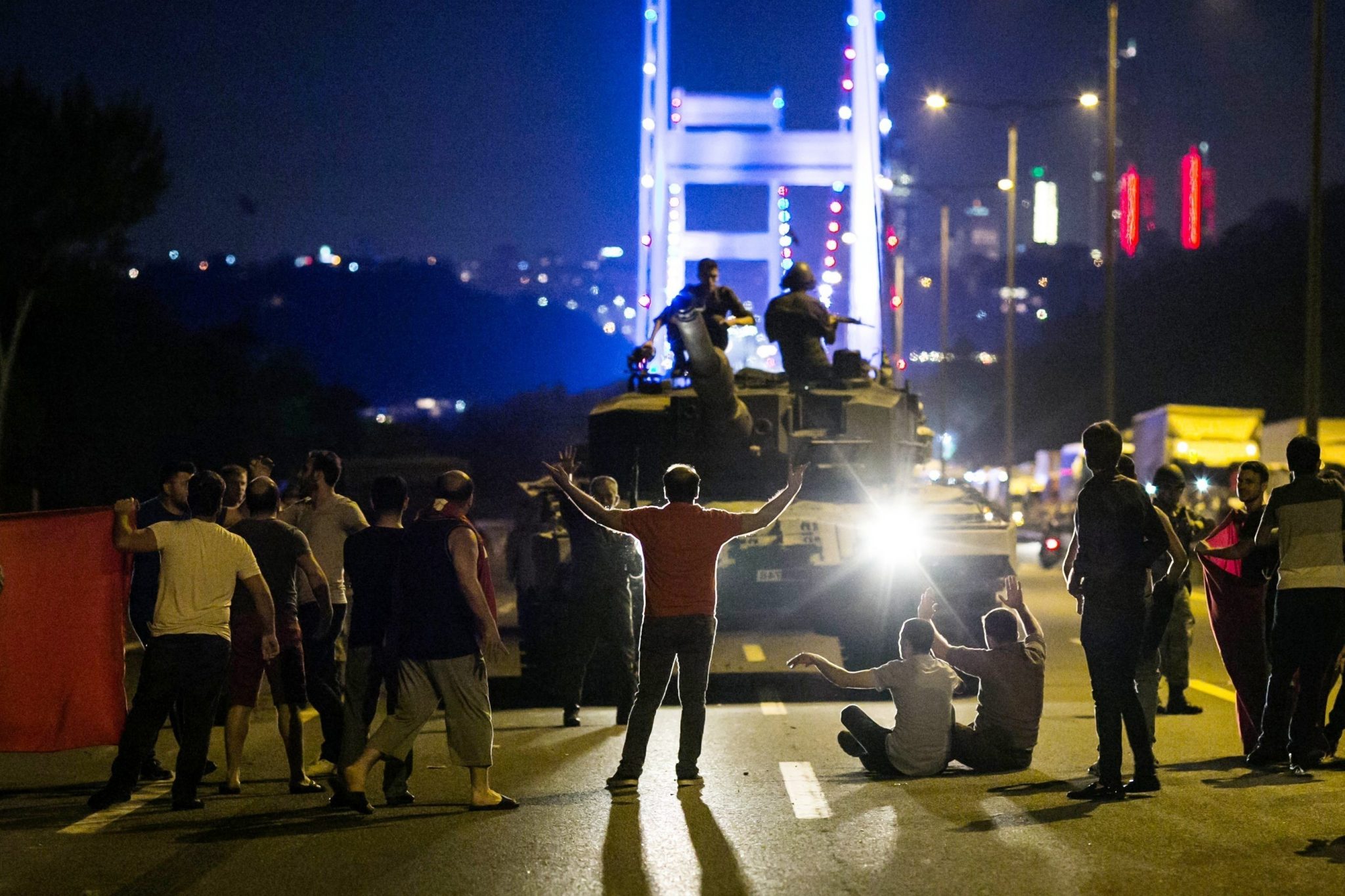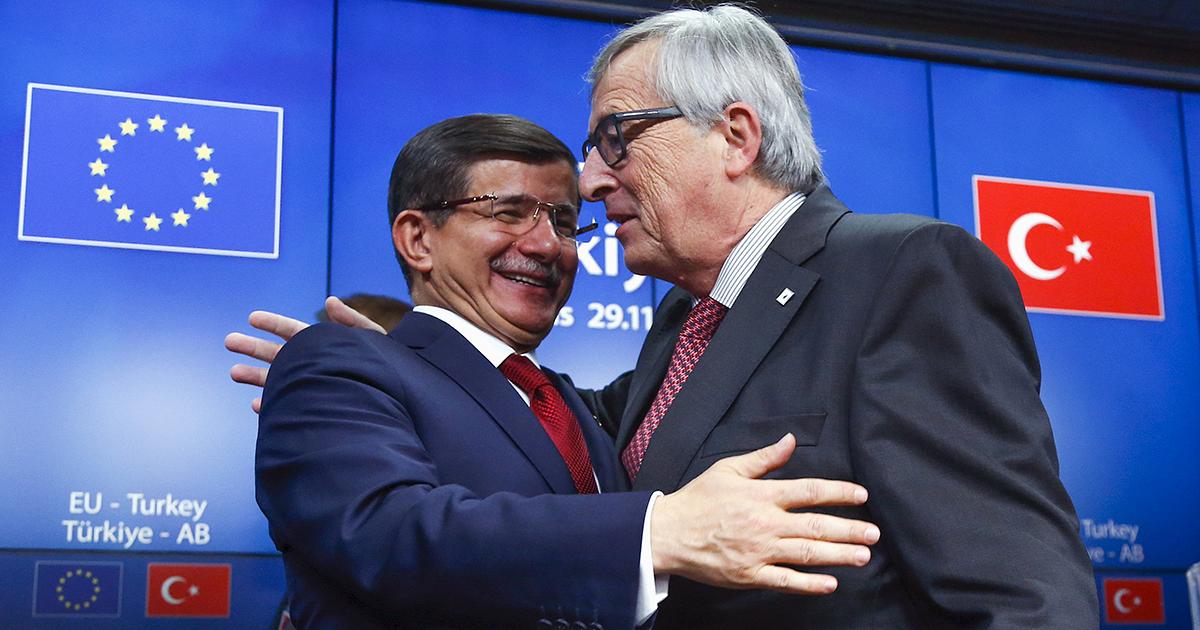
[dropcap size=small]Turkey experienced an alleged coup d’état on July 15, 2016, also known as the “July 15 uprising.” Badly organized plotters made an ill-fated attempt to seize the control of the country in which 249 innocent civilians lost their lives. It has been one year since this shadowy attempt, but we still do not know how it occurred except for how it has been justified to repress dissidents.
When I asked a well-known Washington DC scholar and expert on Turkey and the Middle East politics about what really prompted the coup, he likened the July 15 uprising to the Kirov case. Sergey Kirov, who was assassinated in 1934, was a prominent Bolshevik leader in the Soviet Union. Despite lacking evidence, historians believe that Stalin was behind Kirov’s assassination and that the action served as a pretext for Stalin to perpetrate the Great Purges in the 1930s.
History is full of shadowy cases that serve as a pretext for authoritarian leaders to subdue their opponents. Since all the governmental institutions are obedient to an autocratic leader, we have not convincingly learned how these cases have transpired.
Last month, a helicopter attack targeted the Supreme Court in Venezuela. After the attack, President Nicolas Maduro described the attack as an attempted coup perpetrated by terrorists. Again, we do not know who was behind the helicopter attack, and determining who orchestrated the attack seems impossible under a Venezuelan justice system in ruins. What we do know is that Maduro described the attack as an attempted coup. We can surmise that he used the attack as a pretext to quell the dissidents and to legitimize ongoing persecution in the country.
In addition to being part of blurry cases used as a pretext, autocratic leaders tend to label dissidents as terrorists. It has been especially common for leaders in the Middle East to view their opponents as terrorists. For instance, President Abdel Fattah el-Sisi in Egypt declared the Muslim Brotherhood a terrorist organization immediately after taking office in 2014. Recently, we have seen incidents in Turkey that the government has used as a pretext to persecute opponents and declare them to be terrorists.
The Turkish government has failed to conduct a credible investigation of who was behind the July 15 uprising. The government’s investigation so far has relied on torture-induced statements rather than solid evidence. We are left to wonder who prepared the military coup, who assassinated 249 innocent people, who beheaded the soldier on the Bosphorus bridge, who organized the demonstrators that look like ISIS or al-Qaeda fighters on the streets, who bombed the parliament, why there was a lack of intelligence, why the soldiers appeared on the streets at a time of day when people would be present in the attack area, why these soldiers shut down the Bosphorus bridge in only one direction, why the government did not prevent the attempted military coup even though it was clear that some people in the bureaucracy and the government had learned about it several days before it happened, why the government was very well-prepared to benefit from the results of the military coup rather than being prepared to prevent it, how the government detected the linkages of thousands of judges, prosecutors, police officers, attorneys, and military personnel with the attempted coup in about 10 hours after the attack occurred, who prepared the list of officials to be fired and jailed, what criteria were used to make those lists, why the government fired and replaced almost 160 Western-minded and NATO-oriented generals with allegedly Russian-minded generals even though only several generals were involved in the uprising, why President Recep Tayyip Erdogan said that he learned about the uprising from his brother-in-law, why he gave four different explanations of how he learned about the coup, and why he has not fired high-level intelligence officials despite intelligence weaknesses.
All of these questions deserve satisfying, credible, and convincing answers; however, getting those answers under a repressive government is likely impossible. No prosecutors or judges would dare to violate the interests of the government. If they were to do so, they will be declared terrorists and put in jail. Lacking evidence to the contrary, all we know for sure about the attempted military coup is that the government used the event as a pretext to legitimize its ongoing persecution, torture, and repression of dissidents it wants to label as terrorists.
It should be noted that all definitions of terror include the use of force or violence against civilians. Although thousands of judges, prosecutors, police officers, and military personnel who are not involved in the attempted military coup have been fired or otherwise lost their jobs and have been jailed since July 2016, none of these officers or their relatives have been involved in a crime or have even committed a misdemeanor.
The Turkish story that ended with the country being transformed into an authoritarian state and that exploits the July 15 coup attempt to justify repression began with four police investigations that led to the disclosure of criminal linkages of high-level politicians and bureaucrats. The only way for these officials to be immune from these investigations is to remove all risky officers from the government.
In the first case, unveiled on December 17, 2013, and known as the December 17th scandal in Turkey, the police investigated an Iranian facilitator, Reza Zarrab, who took an active role in breaking the embargo imposed by United Nations, the United Sates, and the European Union because of Iran’s steadfast and stubborn attitude about developing nuclear weapons. Given that it was prohibited to circulate Iranian money during the embargo, the Ahmadinejad government developed techniques to evade the embargo, hiring some facilitators who were in charge of circulating Iranian money in return for giving bribes. The police investigation unveiled bribery transactions between Zarrab and four ministers as well as with the family members of Erdogan. Zarrab was arrested in Miami in March 2016 on similar charges from the United States District Court for the Southern District of New York. Zarrab is scheduled to appear before a grand jury on October 30, 2017. It seems that this case is very disturbing for some high-level politicians and bureaucrats in Turkey.
In the second case, revealed on December 25, 2013, and known as the December 25th scandal, the son of Erdogan was the suspect. The police found solid evidence that Erdogan’s son was part of a corruption cycle.
The third case disclosed terrorist linkages of some Turkish politicians and bureaucrats in Syria. Suspicions arose in early 2014, prompting the police to frisk trucks destined for Syria, purportedly to deliver humanitarian aid. Despite the government’s tremendous efforts to obstruct justice, the military and the police were able to search the trucks and found a considerable number of weapons. It was alleged that these trucks were controlled by the Turkish Intelligence Unit. In the wake of contradictory explanations made by members of the Turkish government, Can Dundar, former editor-in-chief at the news outlet Cumhuriyet, published the footage of weapons in the trucks. Dundar was arrested and released after three months. He then left the country. Last month, however, the court announced its verdict and sentenced one of the parliament members from the Republican People’s Party, Enis Berberoglu, to 25 years in prison.
Finally, the fourth case investigated linkages between the Iranian Revolutionary Guard Corpse and some high-level officials in 2011 and 2012. The investigation revealed that Iranian spies had created the terrorist organization Tawhid Salam Quds Force and infiltrated Turkish politics and bureaucracy. Interestingly, the government ordered investigators to drop the case, despite an abundance of surveillance evidence and wiretappings. It is possible to obtain evidence on these four cases from open sources. Most wiretappings are in YouTube. Nobody knows how all the evidence has been leaked.
These four cases are the main reasons why Erdogan started the crackdown and purged thousands of officers. Erdogan apparently reasoned that the only way to stop further investigations was to remove the opposition from the government and replace it with officials who are obedient to the government. The country’s secular constitution, however, was an obstacle for the government, and the government was not satisfied with the level of purges. According to some comments, the government needed a Kirov case. That is why Erdogan described the July 15 attempted coup as a “gift from God.”
Sadly, it has been almost a year since the attempted military coup, and we still do not know who was behind this uprising and why the government has failed to remove the shadows on this case. It is clear, however, that most of the people who were fired and jailed have no links to attempted military coup. Furthermore, it is clear that the government has exploited the coup and used it to legitimize ongoing persecutions and a government makeover designed to fill its ranks with officials obedient to the government rather than to the rule of law.
The ongoing crackdown and purges also have distanced Turkey from the Western values and democracy to which it had aspired. Turkey is much more isolated in the global community and now lean toward Russia and Iran rather than toward its Western allies. The West is unaware that it is losing a reliable and secular ally in the region. Repressed, Western-minded people in Turkey are trying to figure out why the West has turned a blind eye to the ongoing persecutions. One is left to speculate that maintaining the Incirlik military base in Turkey and keeping Syrian refugees far from Europe are more important to the West than the repression of democracy in Turkey.
[toggler title=”Mahmut Cengiz” ]Dr. Mahmut Cengiz is a research scholar at Terrorism, Transnational Crime and Corruption Center (TraCCC). He is a leading expert on transnational crime, corruption, terrorism, money laundering, and terrorist financing as well as human trafficking and smuggling of nuclear materials with a particular focus on the Middle East. He specializes in the relationship between crime and conflict in peacekeeping missions. He is also a security expert on policies related to crime and terror issues.
Holding two masters and two doctorate degrees in Turkey and in USA, Dr. Cengiz has a broader academic and teaching background on international relations, sociology, and public policy. He is the author of four books, a number of articles, and book chapters regarding organized crime, smuggling, terrorist financing, and trafficking issues. His recently published book (2015), combines theory and field experience and discusses many illicit trade issues in the Middle East. He recently has studied transnational threats in the Middle East in terms of conflict in Syria and ISIS, the role of regional drug criminal networks, the interest of terrorist organizations in WMD, and the effects of corruption over the instability in the Middle East. Dr. Cengiz has spoken at various international fora on transnational crime, terrorism, and corruption.[/toggler]



